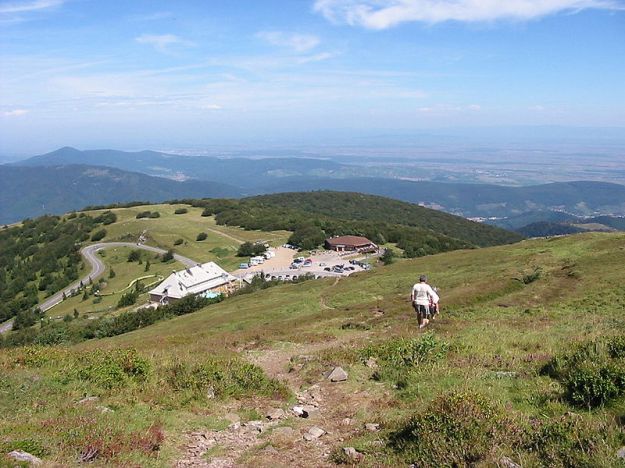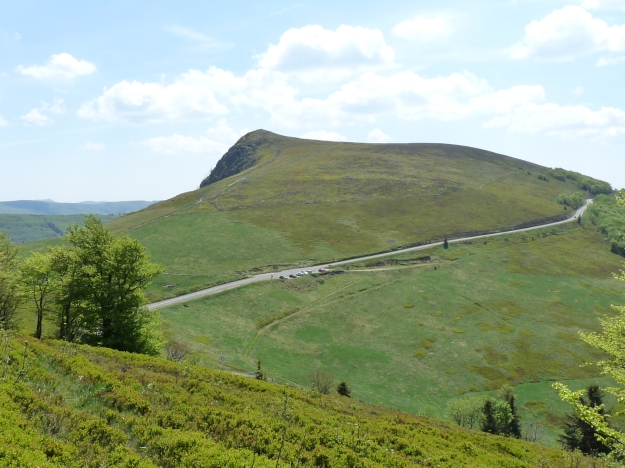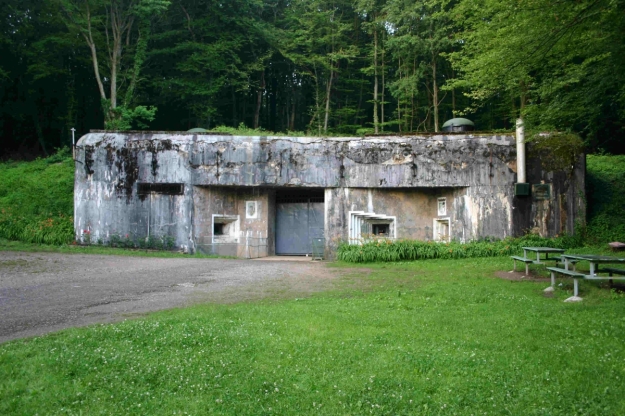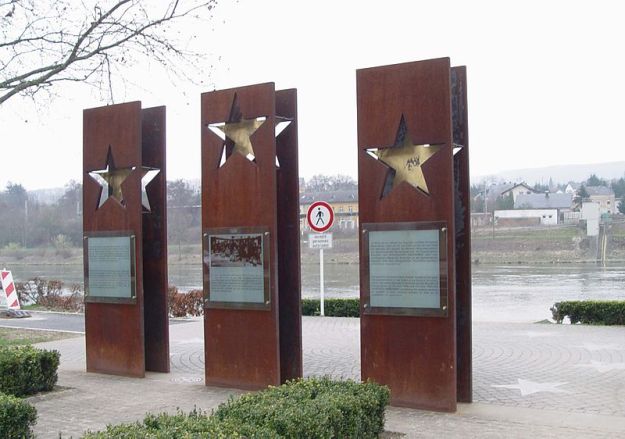Via the GR 5 in France I walked from the Jura to the Vosges. This area was more populated and I found less easily a place to sleep. On a rainy evening at twilight I was only welcome when I paid for my overnight stay. My stories and my kindness were not enough. I had no more money and after a few kilometres walk I found a place to sleep in the open air. Covered in plastic I spent the night vigilant. The next morning I was clammy and benumbed. After an hour walk I was warm again.
In the Vosges there were sufficient opportunities to spent the night in the wild. It was beautiful weather. At night the moon and the starry sky gave me comfort. During the day I enjoyed the beautiful view. At a few places I could almost oversee my whole way from the snowy Alps.
During my walk on the mountain peaks of the Vosges I met new ghosts. A century ago this chain of peaks formed the border between Alsace in Germany and Lorraine in France. The road – Route des Crêtes – was built by the French army during the First World War [2]. The road is situated on the French side of the chain, so the road was less vulnerable for the German guns. The ghosts of the victims during these many wars between France and Germany accompanied me to the Luxembourg border. On this part they were my companions. I promised that my breath would be their breath as long as I lived just as my breath was already the breath of the villagers. Once I hoped to arrive home together with them all.
The path on the mountain peaks was congested; I got help and support of many people. In the valleys I felt less at home. By cover in the valleys I could not see the road; I felt trapped. I wanted to keep an eye on the road. Without sight on the heaven and earth, the ghosts of the villagers and of the fallen soldiers came before my eyes [4]. Only much later could I could unite heaven and earth; afterwards I had no more difficulty to fall asleep anywhere – even within walls and in valleys.
With a companion in the North of France I made a small detour to the Maginot line [6]. We saw the remnants at Michelsberg [7] and Hackenberg [8]. We were surprised how a society could feel safe and sheltered behind this dark burrows in the ground filled with terror for the society on the other side. With my eyes on the road, unity had many faces, and two had no duality. The Maginot line – as part of the many wars between France and Germany – fell beyond my comprehension.
At Schengen I illegally entered the other world of Luxembourg. Later the treaty for free movement of people in a part of Europe was agreed upon at this place. After such a huge detour with so much suffering and madness of everyday life, unity could finally be restored. It remains curious that a Treaty on paper is needed for a unit that is for my mother as natural as breathing, moving eyes, hands, and moving legs for walking; unity with many faces and two without duality.
Much later – on the 12th of October 2012 – the Nobel Peace Prize was awarded to the European Union, because the European Union and its predecessors had contributed to peace and reconciliation, democracy and human rights in Europe for more than sixty years. So much effort for a contribution that is as natural as breathing.
In Luxembourg, I entered a fairy-tale troll country.
[1] Source image: http://fr.wikipedia.org/wiki/Fichier:Col_du_Grand_Ballon.jpg
[2] Source: http://en.wikipedia.org/wiki/Route_des_Cr%C3%AAtes
[3] Source image: http://en.wikipedia.org/wiki/File:Rothenbachkopf_nord.jpg
[4] See also: Cleary, Thomas, Book of Serenity – One Hundred Zen Dialogues. Bosten: Shambhala, 1998 p. 70.
[5] Source image: http://fr.wikipedia.org/wiki/Fichier:Vosges_val_munster.jpg
[6] See also: http://nl.wikipedia.org/wiki/Maginotlinie
[7] See also: http://fr.wikipedia.org/wiki/Ouvrage_du_Michelsberg
[8] See also: http://fr.wikipedia.org/wiki/Ouvrage_du_Hackenberg
[9] Source image: http://commons.wikimedia.org/wiki/Ouvrage_du_Michelsberg
[10] Source image: http://nl.wikipedia.org/wiki/Schengen_(Luxemburg)











